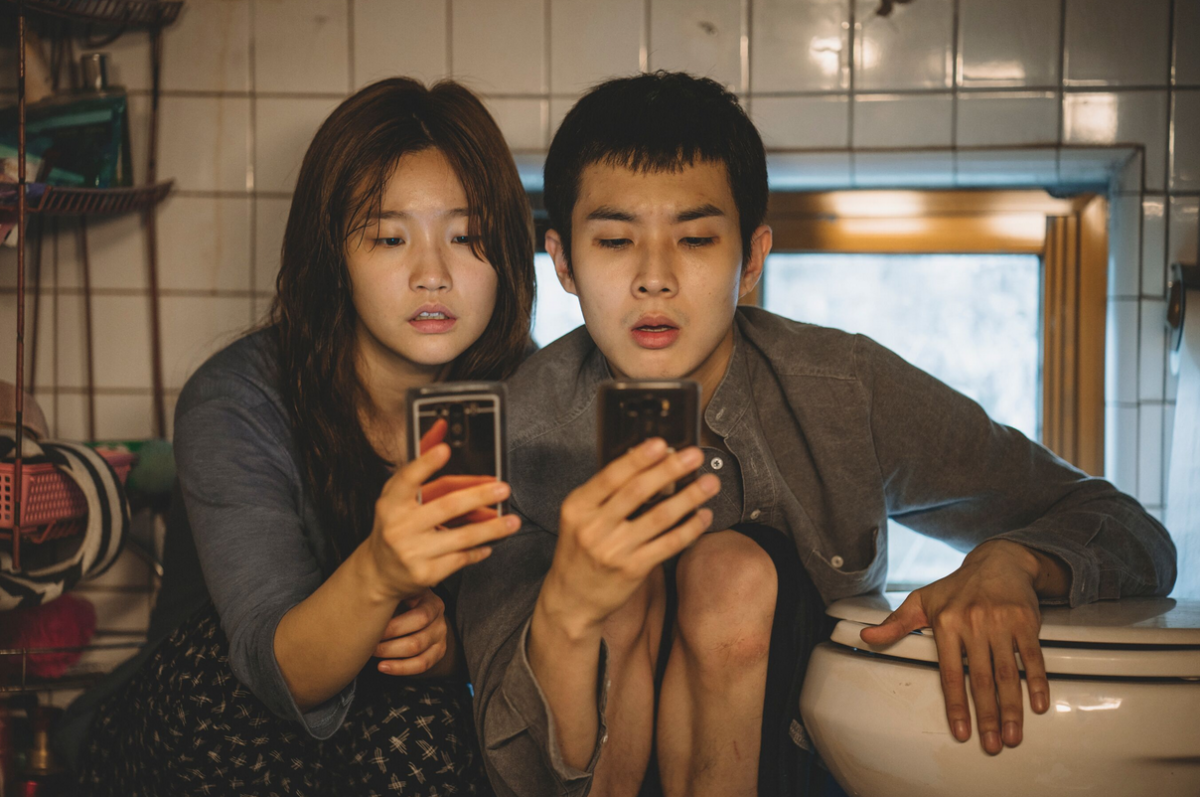
Upstairs/downstairs has been a common theme in literature and film, documenting the tension between those who dwell in the fancy mansions and those who serve them. The masterful Korean director Bong Joon Ho has taken this concept to soaring new heights (and shocking depths) in his latest film, Parasite, a spellbinding social satire and thriller.
The Kim family live in a squalid basement apartment in the city. They eat junk food, scrounge for any money they can make, and have to perch in one small corner of the room (also their bathroom), phones raised in the air, to steal WiFi from a neighboring coffee shop (that is, when their phones have not been turned off).
One day, the Kim son, Ki-woo (Woo-sik Choi), is visited by Min, a college-attending friend of his, who makes an intriguing proposal: While Min studies abroad, Ki-woo can take over his job teaching English to the daughter of the very wealthy Park family. Ki-Woo wonders why Min doesn’t just ask one of his college buddies to do it? Min confesses that he’s in love with the Park daughter and trusts only his good friend to spend so much time with her.
So, with the help of his Photoshop-savvy sister, Ki-jung (So-dam Park), Ki-woo forges a fake diploma and makes his way to the Park residence, a stunning, modern home with floor-to-ceiling windows, a coolly minimalist aesthetic, and sweeping vistas. (There are three yapping dogs who pee indoors—the evidence is quickly disposed of by the maid—because rich people always seem to have those.) Ki-woo tries not to look overly impressed.
He meets the pretty and somewhat scatterbrained Mrs. Park (Yeo-yeong Jo), who leads him upstairs to her shy daughter (Ji-so Jung), who is immediately smitten by her new tutor. He returns the feelings, seemingly forgetting, or not caring about, the implied contract he made with Min.
Then there’s an apparently fortuitous twist of fate: Turns out there is another Park child who needs a tutor, the young Da-song (Hyun-jun Jung), a dreamy, artistic, overly fussed over boy, whom the family believes suffers from seizures. Thinking on his feet, Ki-woo says he might know someone—a friend of a friend’s cousin—who is an art teacher and art therapist. Should he put them in touch? Of course, he’s actually thinking of his languorous, cigarette smoking sister, who shows up to her interview acting like she owns the place.
You can see where it’s going from here—well, for a while, at least. The Kim family slowly begins to take over the household. The father, Ki-taek (Kang-ho Song), becomes the chauffeur to the slick Mr. Park (Sun-kyun Lee) and the mother (Hye-jin Jang) becomes the maid. Of course, to get these jobs, they need to find sneaky ways to get rid of the previous employees—the efficient maid (Jeong-eun Lee) is particuarly embedded, having lived in the house since before the Parks moved in—and we begin to understand that desperation can make people both resourceful and devious.
This is one of the things I loved so much about the film. The Kim family aren’t depicted as saints—we root for them because we like them (they’re a tight knit, darkly humorous bunch), not because their poverty bestows upon them any kind of purity. Likewise, the Park family are not evil. In fact, for much of the film they seem like very appealing people—wealthy but kind (“they’re nice because they’re rich,” Mrs. Kim grumbles)—simply unbothered by any pedestrian concerns. But later, as we get to know them more, we see that they wear their privilege a bit too comfortably. They seem to assume that anyone who is poor suffers from a failure of hygiene —and possibly morality. What begins as an employment bonanza turns into a kettle of simmering resentments, as the Kims begin to grok the way the Parks perceive them. And that’s when the real fun starts.
Parasite is stuffed with everything—gorgeous architecture, beautiful people, shocking violence, ingenious twists, wicked humor, and clear-eyed social commentary. The upstairs/downstairs conflict is a tale as old as time, but Bong Joon Ho puts all kinds of delicious and devilish new spins on it. Of course, with his title, he makes you think—who are the real parasites: the poor who glom onto the rich or the rich who heedlessly take from the poor? What’s more, aren’t we all parasites in a way, as we attempt to elevate (or keep) our status in society? The ubiquity of the phone in the film—it’s a way to plot schemes, get jobs, communicate surreptitiously, and at one point is literally wielded as a weapon—makes this very much a work of our time. Parasite is a stone-cold 21st-century classic.
